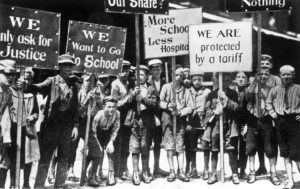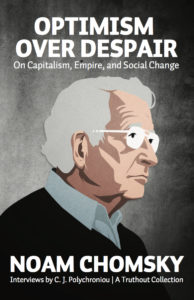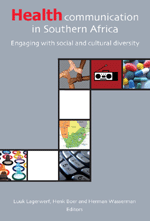
1902, Philadelphia, Pennsylvania, USA — Child labor strike in Philadelphia, Pennsylvania. Photograph 1902 — Image by © Bettmann/CORBIS
This is the first part of a wide-ranging interview with world-renowned public intellectuals Noam Chomsky and Robert Pollin. The next installment will appear on October 24.
Not long after taking office, it became evident that Donald Trump had engaged in fraudulent populism during his campaign. His promise to “Make America Great Again” has been exposed as a lie, as the Trump administration has been busy extending US military power, exacerbating inequality, reverting to the old era of unregulated banking practices, pushing for more fuel fossil drilling and stripping environmental regulations.
In the Trump era, what would an authentically populist, progressive political agenda look like? What would a progressive US look like with regard to jobs, the environment, finance capital and the standard of living? What would it look like in terms of education and health care, justice and equality? In an exclusive interview with C.J. Polychroniou for Truthout, world-renowned public intellectuals Noam Chomsky and Robert Pollin tackle these issues. Noam Chomsky is professor emeritus of linguistics at MIT and laureate professor in the department of linguistics at the University of Arizona. Robert Pollin is distinguished professor of economics and co-director of the Political Economy Research Institute at the University of Massachusetts at Amherst. Their views lay the foundation for a visionary — yet eminently realistic — progressive social and economic order for the United States.
C.J. Polychroniou: Noam, the rise of Donald Trump has unleashed a rather unprecedented wave of social resistance in the US. Do you think the conditions are ripe for a mass progressive/socialist movement in this country that can begin to reframe the major policy issues affecting the majority of people, and perhaps even challenge and potentially change the fundamental structures of the US political economy?
Noam Chomsky: There is indeed a wave of social resistance, more significant than in the recent past — though I’d hesitate about calling it “unprecedented.” Nevertheless, we cannot overlook the fact that in the domain of policy formation and implementation, the right is ascendant, in fact some of its harshest and most destructive elements [are rising].
Nor should we overlook a crucial fact that has been evident for some time: The figure in charge, though often ridiculed, has succeeded brilliantly in his goal of occupying media and public attention while mobilizing a very loyal popular base — and one with sinister features, sometimes smacking of totalitarianism, including adoration of The Leader. That goes beyond the core of loyal Trump supporters…. [A majority of Republicans] favor shutting down or at least fining the press if it presents “biased” or “false news” — terms that mean information rejected by The Leader, so we learn from polls showing that by overwhelming margins, Republicans not only believe Trump far more than the hated mainstream media, but even far more than their own media organ, the extreme right Fox news. And half of Republicans would back postponing the 2020 election if Trump calls for it.
It is also worth bearing in mind that among a significant part of his worshipful base, Trump is regarded as a “wavering moderate” who cannot be fully trusted to hold fast to the true faith of fierce White Christian identity politics. A recent illustration is the primary victory of the incredible Roy Moore in Alabama despite Trump’s opposition. (“Mr. President, I love you but you are wrong,” as the banners read). The victory of this Bible-thumping fanatic has led senior party strategists to [conclude] “that the conservative base now loathes its leaders in Washington the same way it detested President Barack Obama” — referring to leaders who are already so far right that one needs a powerful telescope to locate them at the outer fringe of any tolerable political spectrum.
The potential power of the ultra-right attack on the far right is [illustrated] by the fact that Moore spent about $200,000, in contrast to his Trump-backed opponent, the merely far-right Luther Strange, who received more than $10 million from the national GOP and other far-right sources. The ultra-right is spearheaded by Steve Bannon, one of the most dangerous figures in the shiver-inducing array that has come to the fore in recent years. It has the huge financial support of the Mercer family, along with ample media outreach through Breitbart news, talk radio and the rest of the toxic bubble in which loyalists trap themselves.
In the most powerful state in history, the current Republican Party is ominous enough. What is not far on the horizon is even more menacing.
Much has been said about how Trump has pulled the cork out of the bottle and legitimized neo-Nazism, rabid white supremacy, misogyny and other pathologies that had been festering beneath the surface. But it goes much beyond even that.
I do not want to suggest that adoration of the Dear Leader is something new in American politics, or confined to the vulgar masses. The veneration of Reagan that has been diligently fostered has some of the same character, in intellectual circles as well. Thus, in publications of the conservative Hoover Institution at Stanford University, we learn that Reagan’s “spirit seems to stride the country, watching us like a warm and friendly ghost.” Lucky us, protected from harm by a demi-god.
Whether by design, or simply inertia, the Republican wrecking ball has been following a two-level strategy. Trump keeps the spotlight on himself with one act after another, assuming (correctly) that yesterday’s antics will be swept aside by today’s. And at the same time, often beneath the radar, the “respectable” Republican establishment chips away at government programs that might be of benefit to the general population, but not to their constituency of extreme wealth and corporate power. They are systematically pursuing what Financial Times economic correspondent Martin Wolf calls “pluto-populism,” a doctrine that imposes “policies that benefit plutocrats, justified by populist rhetoric.” An amalgam that has registered unpleasant successes in the past as well.
Meanwhile, the Democrats and centrist media help out by focusing their energy and attention on whether someone in the Trump team talked to Russians, or [whether] the Russians tried to influence our “pristine” elections — though at most in a way that is undetectable in comparison with the impact of campaign funding, let alone other inducements that are the prerogative of extreme wealth and corporate power and are hardly without impact.
The Russian saboteurs of democracy seem to be everywhere. There was great anxiety about Russian intervention in the recent German elections, perhaps contributing to the frightening surge of support for the right-wing nationalist, if not neo-fascist, “Alternative for Germany” [AfD]. AfD did indeed have outside help, it turns out, but not from the insidious Putin. “The Russian meddling that German state security had been anticipating apparently never materialized,” according to Bloomberg News. “Instead, the foreign influence came from America.” More specifically, from Harris Media, whose clients include Marine Le Pen’s National Front in France, Benjamin Netanyahu in Israel, and our own Donald Trump. With the valuable assistance of the Berlin office of Facebook, which created a population model and provided the needed data, Harris’s experts micro-targeted Germans in categories deemed susceptible to AfD’s message — with some success, it appears. The firm is now planning to move on to coming European races, it has announced.
Nevertheless, all is not bleak by any means. The most spectacular feature of the 2016 elections was not the election of a billionaire who spent almost as much as his lavishly-funded opponent and enjoyed fervent media backing. Far more striking was the remarkable success of the Sanders campaign, breaking with over a century of mostly bought elections. The campaign relied on small contributions and had no media support, to put it mildly. Though lacking any of the trappings that yield electoral success in our semi-plutocracy, Sanders probably would have won the Democratic Party nomination, perhaps the presidency, if it hadn’t been for the machinations of party managers. His popularity undimmed, he is now a leading voice for progressive measures and is amassing considerable support for his moderate social democratic proposals, reminiscent of the New Deal — proposals that would not have surprised President Eisenhower, but are considered practically revolutionary today as both parties have shifted well to the right [with] Republicans virtually off the spectrum of normal parliamentary politics.
Offshoots of the Sanders campaign are doing valuable work on many issues, including electoral politics at the local and state level, which had been pretty much abandoned to the Republican right, particularly during the Obama years, to very harmful effect. There is also extensive and effective mobilization against racist and white supremacist pathologies, often spearheaded by the dynamic Black Lives Matter movement. Defying Trumpian and general Republican denialism, a powerful popular environmental movement is working hard to address the existential crisis of global warming. These, along with significant efforts on other fronts, face very difficult barriers, which can and must be overcome.
Bob, it is clear by now that Trump has no plan for creating new jobs, and even his reckless stance toward the environment will have no effect on the creation of new jobs. What would a progressive policy for job creation look like that will also take into account concerns about the environment and climate change?
Robert Pollin: A centerpiece for any kind of progressive social and economic program needs to be full employment with decent wages and working conditions. The reasons are straightforward, starting with money. Does someone in your family have a job and, if so, how much does it pay? For the overwhelming majority of the world’s population, how one answers these two questions determines, more than anything else, what one’s living standard will be. But beyond just money, your job is also crucial for establishing your sense of security and self-worth, your health and safety, your ability to raise a family, and your chances to participate in the life of your community.
How do we get to full employment, and how do we stay there? For any economy, there are two basic factors determining how many jobs are available at any given time. The first is the overall level of activity — with GDP as a rough, if inadequate measure of overall activity — and the second is what share of GDP goes to hiring people into jobs. In terms of our current situation, after the Great Recession hit in full in 2008, US GDP has grown at an anemic average rate of 1.3 percent per year, as opposed to the historic average rate from 1950 until 2007 of 3.3 percent. If the economy had grown over the past decade at something even approaching the historic average rate, the economy would have produced more than enough jobs to employ all 13 million people who are currently either unemployed or underemployed by the official government statistics, plus the nearly 9 million people who have dropped out of the labor force since 2007.
In terms of focusing on activities where job creation is strong, let’s consider two important sets of economic sectors. First, spending $1 million on education will generate a total of about 26 jobs within the US economy, more than double the 11 jobs that would be created by spending the same $1 million on the US military. Similarly, spending $1 million on investments in renewable energy and energy efficiency will create over 16 jobs within the US, while spending the same $1 million on our existing fossil fuel infrastructure will generate about 5.3 jobs — i.e. building a green economy in the US generates roughly three times more jobs per dollar than maintaining our fossil fuel dependency. So full employment policies should focus on accelerating economic growth and on changing our priorities for growth — as two critical examples, to expand educational opportunities across the board and to build a green economy, while contracting both the military and the fossil fuel economy.
A full employment program also obviously needs to focus on the conditions of work, starting with wages. The most straightforward measure of what neoliberal capitalism has meant for the US working class is that the average wage for non-supervisory workers in 2016 was about 4 percent lower than in 1973. This is while average labor productivity — the amount each worker produces over the course of a year — has more than doubled over this same 43-year period. All of the gains from productivity doubling under neoliberalism have therefore been pocketed by either supervisory workers, or even more so, by business owners and corporate shareholders seeing their profits rise. The only solution here is to fight to increase worker bargaining power. We need stronger unions and worker protections, including a $15 federal minimum wage. Such initiatives need to be combined with policies to expand the overall number of job opportunities out there. A fundamental premise of neoliberalism from day one has been to dismantle labor protections. We are seeing an especially aggressive variant of this approach today under the so-called “centrist” policies of the new French President Emmanuel Macron.
What about climate change and jobs? A view that has long been touted, most vociferously by Trump over the last two years, is that policies to protect the environment and to fight climate change are bad for jobs and therefore need to be junked. But this claim is simply false. In fact, as the evidence I have cited above shows, building a green economy is good for jobs overall, much better than maintaining our existing fossil-fuel based energy infrastructure, which also happens to be the single most significant force driving the planet toward ecological disaster.
It is true that building a green economy will not be good for everyone’s jobs. Notably, people working in the fossil fuel industry will face major job losses. The communities in which these jobs are concentrated will also face significant losses. But the solution here is straightforward: Just Transition policies for the workers, families and communities who will be hurt as the coal, oil and natural gas industries necessarily contract to zero over roughly the next 30 years. Working with Jeannette Wicks-Lim, Heidi Garrett-Peltier and Brian Callaci at [the Political Economy Research Institute], and in conjunction with labor, environmental and community groups in both the states of New York and Washington, we have developed what I think are quite reasonable and workable Just Transition programs. They include solid pension protections, re-employment guarantees, as well as retraining and relocation support for individual workers, and community-support initiatives for impacted communities.
The single most important factor that makes all such initiatives workable is that the total number of affected workers is relatively small. For example, in the whole United States today, there are a total of about 65,000 people employed directly in the coal industry. This represents less than 0.05 percent of the 147 million people employed in the US. Considered within the context of the overall US economy, it would only require a minimum level of commitment to provide a just transition to these workers as well as their families and communities.
Finally, I think it is important to address one of the major positions on climate stabilization that has been advanced in recent years on the left, which is to oppose economic growth altogether, or to support “de-growth.” The concerns of de-growth proponents — that economic growth under neoliberal capitalism is both grossly unjust and ecologically unsustainable — are real. But de-growth is not a viable solution. Consider a very simple example — that under a de-growth program, global GDP contracts by 10 percent. This level of GDP contraction would be five times larger than what occurred at the lowest point of the 2007-09 Great Recession, when the unemployment rate more than doubled in the United States. But even still, this 10 percent contraction in global GDP would have the effect, on its own, of reducing carbon dioxide (CO2) emissions by precisely 10 percent. At a minimum, we would still need to cut emissions by another 30 percent within 15 years, and another 80 percent within 30 years to have even a fighting chance of stabilizing the climate. As such, the only viable climate stabilization program is to invest massively in clean renewable and high energy efficiency systems so that clean energy completely supplants our existing fossil-fuel dependent system within the next 30 years, and to enact comparable transformations in agricultural production processes.
The “masters of the universe” have made a huge comeback since the last financial crisis, and while Trump’s big-capital-friendly policies are going to make the rich get richer, they could also spark the next financial crisis. So, Bob, what type of progressive policies can and should be enforced to contain the destructive tendencies of finance capital?
Pollin: The classic book Manias, Panics, and Crashes by the late MIT economist Charles Kindleberger makes clear that, throughout the history of capitalism, unregulated financial markets have persistently produced instability and crises. The only deviation from this long-term pattern occurred in the first 30 years after World War II, roughly from 1946-1975. The reason US and global financial markets were much more stable over this 30-year period is that the markets were heavily regulated then, through the Glass-Steagall regulatory system in the US, and the Bretton Woods system globally. These regulatory systems were enacted only in response to the disastrous Great Depression of the 1930s, which began with the 1929 Wall Street crash and which then brought global capitalism to its knees.
Of course, the big Wall Street players always hated being regulated and fought persistently, first to evade the regulations and then to dismantle them. They were largely successful through the 1980s and 1990s. But the full, official demise of the 1930s regulatory system came only in 1999, under the Democratic President Bill Clinton. At the time, virtually all leading mainstream economists — including liberals, such as Larry Summers, who was Treasury Secretary when Glass-Steagall was repealed — argued that financial regulations were an unnecessary vestige of the bygone 1930s. All kinds of fancy papers were written “demonstrating” that the big players on Wall Street are very smart people who know what’s best for themselves and everyone else — and therefore, didn’t need government regulators telling them what they could or could not do. It then took less than eight years for hyper-speculation on Wall Street to once again bring global capitalism to its knees. The only thing that saved capitalism in 2008-09 from a repeat of the 1930s Great Depression was the unprecedented government interventions to prop up the system, and the equally massive bail out of Wall Street.
By 2010, the US Congress and President Obama enacted a new set of financial regulations, the Dodd-Frank system. Overall, Dodd-Frank amount to a fairly weak set of measures aiming to dampen hyper-speculation on Wall Street. A large part of the problem is that Dodd-Frank included many opportunities for Wall Street players to delay enactment of laws they didn’t like and for clever lawyers to figure out ways to evade the ones on the books. That said, the Trump administration, led on economic policy matters by two former Goldman Sachs executives, is committed to dismantling Dodd-Frank altogether, and allowing Wall Street to once again operate free of any significant regulatory constraints. I have little doubt that, free of regulations, the already ongoing trend of rising speculation — with, for example, the stock market already at a historic high — will once again accelerate.
What is needed to build something like a financial system that is both stable and supports a full-employment, ecologically sustainable growth framework? A major problem over time with the old Glass-Steagall system was that there were large differences in the degree to which, for example, commercial banks, investment banks, stock brokerages, insurance companies and mortgage lenders were regulated, thereby inviting clever financial engineers to invent ways to exploit these differences. An effective regulatory system today should therefore be guided by a few basic premises that can be applied flexibly but also universally. The regulations need to apply across the board, regardless of whether you call your business a bank, an insurance company, a hedge fund, a private equity fund, a vulture fund, or some other term that most of us haven’t yet heard about.
One measure for promoting both stability and fairness across financial market segments is a small sales tax on all financial transactions — what has come to be known as a Robin Hood Tax. This tax would raise the costs of short-term speculative trading and therefore discourage speculation. At the same time, the tax will not discourage “patient” investors who intend to hold their assets for longer time periods, since, unlike the speculators, they will be trading infrequently. A bill called the Inclusive Prosperity Act was first introduced into the House of Representatives by Rep. Keith Ellison in 2012 and then in the Senate by Bernie Sanders in 2015, [and] is exactly the type of measure that is needed here.
Another important initiative would be to implement what are called asset-based reserve requirements. These are regulations that require financial institutions to maintain a supply of cash as a reserve fund in proportion to the other, riskier assets they hold in their portfolios. Such requirements can serve both to discourage financial market investors from holding an excessive amount of risky assets, and as a cash cushion for the investors to draw upon when market downturns occur.
This policy instrument can also be used to push financial institutions to channel credit to projects that advance social welfare, for example, promoting investments in renewable energy and energy efficiency. The policy could stipulate that, say, at least 5 percent of banks’ loan portfolios should be channeled to into clean-energy investments. If the banks fail to reach this 5 percent quota of loans for clean energy, they would then be required to hold this same amount of their total assets in cash.
Finally, both in the US and throughout the world, there needs to be a growing presence of public development banks. These banks would make loans based on social welfare criteria — including advancing a full-employment, climate-stabilization agenda — as opposed to scouring the globe for the largest profit opportunities regardless of social costs…. Public development banks have always played a central role in supporting the successful economic development paths in the East Asian economies.
Editor’s note: This interview has been lightly edited for length and clarity.
Copyright, Truthout. May not be reprinted without permission.


 Ten years ago, the implosion of Lehman Brothers ignited a financial crisis whose impact and effects were felt virtually across the globe as banks and financial institutions everywhere that were exposed to subprime lending, formed part of a long chain of complicated and interconnected derivatives, and partook freely in Wall Street shenanigans.
Ten years ago, the implosion of Lehman Brothers ignited a financial crisis whose impact and effects were felt virtually across the globe as banks and financial institutions everywhere that were exposed to subprime lending, formed part of a long chain of complicated and interconnected derivatives, and partook freely in Wall Street shenanigans.
